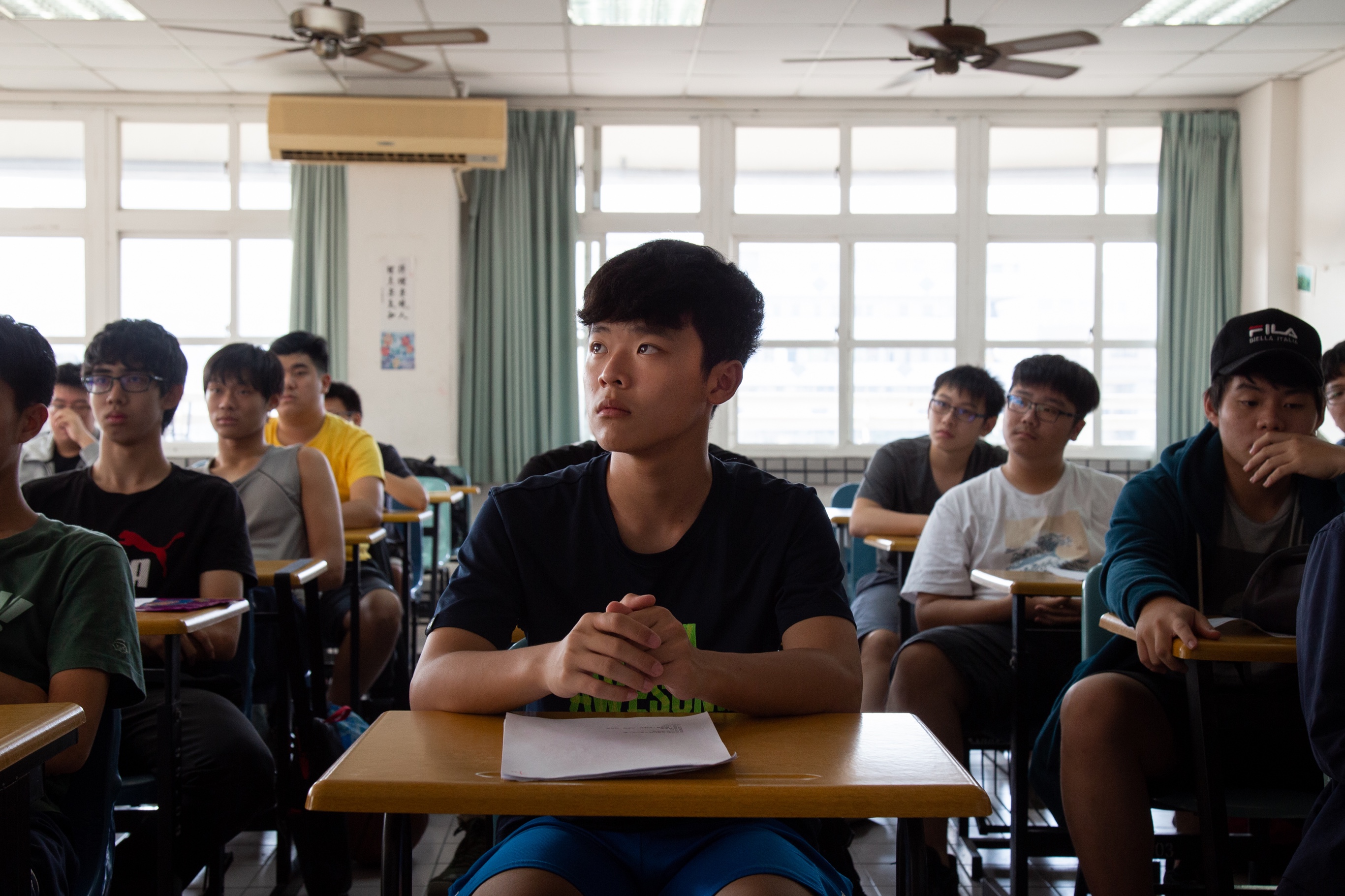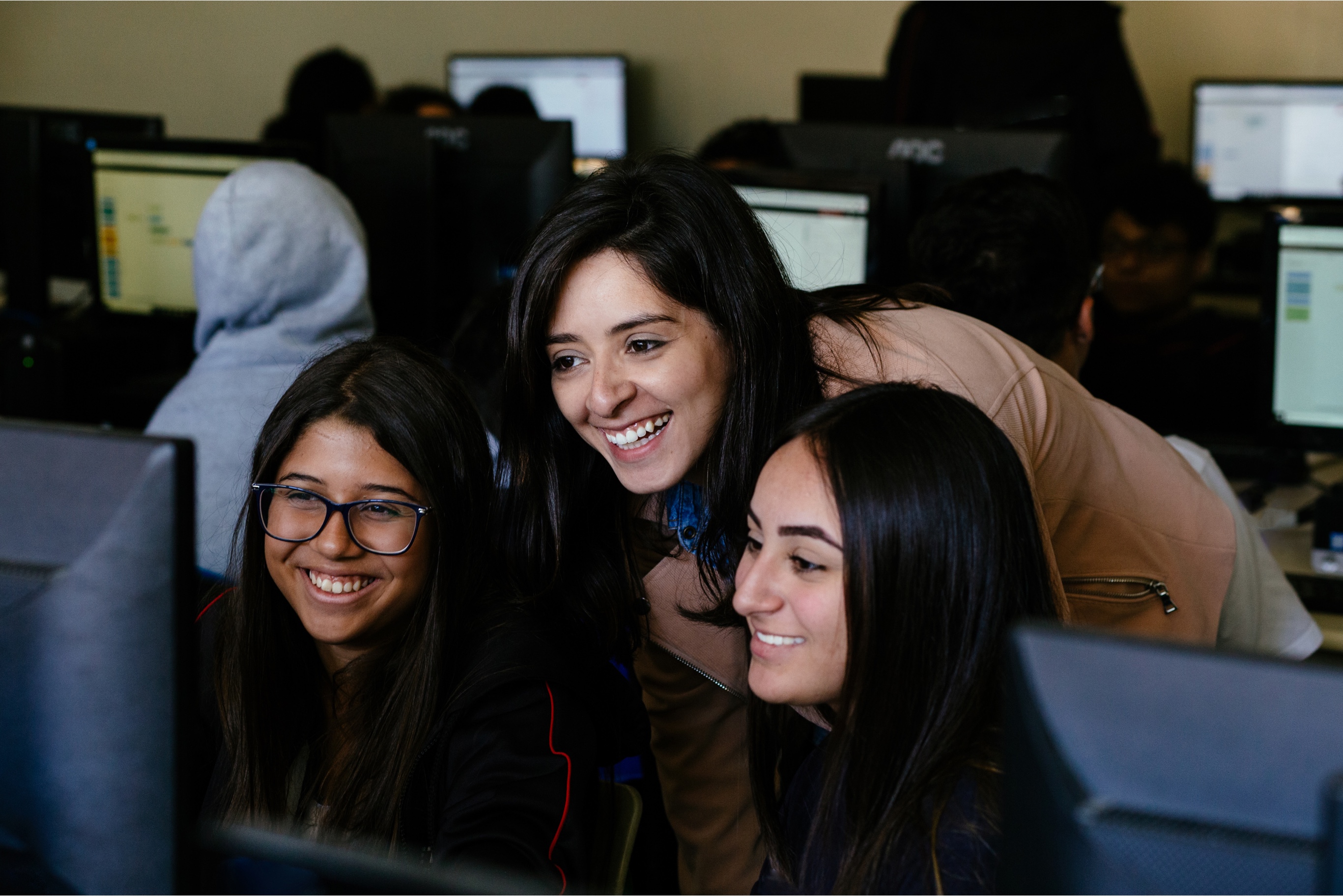Inscrição gratuita
As escolas de P-TECH estão abertas a todos os alunos, sem requisitos de grau ou de teste -ao contrário de outros programas que tenham um processo de admissões competitivo ou roteirado. As escolas P-TECH também têm o objetivo explícito de proporcionar o acesso da faculdade e da indústria a estudantes historicamente sub-representados.
Projetado para diminuir distâncias
O Modelo P-TECH reconhece que os alunos que menos probabilidade têm de concluir um curso superior são aqueles que mais necessitam de experiências universitárias precoces e envolventes. Em particular, estudantes minoritários e de baixa renda estão significativamente subrepresentados nos campi universitários. Eles também têm taxas de conclusão de graduação muito mais baixas do que estudantes de outras origens. EEssa lacuna persiste, apesar da variedade de medidas -desde os salários de entrada, até as taxas de desemprego, até as classificações de satisfação no emprego- que demonstram claramente os benefícios de se matricular e concluir a faculdade. As escolas P-TECH são projetadas para encurtar essa distância e apoiar esses estudantes ao reconhecer e responder às suas necessidades.
As escolas P-TECH cadastram um grupo diversificado de estudantes, incluindo jovens de famílias de baixa renda, estudantes universitários de primeira geração, alunos de língua inglesa e estudantes com deficiência. Alguns alunos chegam com habilidades de leitura e matemática bem abaixo do nível da série, enquanto outros excedem em muito essa norma. Independentemente do desempenho acadêmico prévio dos alunos, o sequenciamento curricular e os suportes instrucionais garantem que todos os alunos desenvolvam as habilidades e conhecimentos que precisam para se formar dentro de seis anos.
Os alunos devem ser altamente engajados e comprometidos em ter sucesso no rigoroso Modelo P-TECH. As famílias devem receber informações de recrutamento que explicam, plenamente, as expectativas acadêmicas, o compromisso de tempo estendido, os graus de associado específicos oferecidos e os detalhes sobre as opções de carreira abertas para graduados de P-TECH. Os estudantes entendem a importância e o valor do trabalho escolar quando podem ver conexões claras entre o currículo acadêmico, experiências comAprendizado no Local de Trabalho, e o percurso de carreira que eles perseguem.

Apoio a todos os alunos
Os alunos do P-TECH têm acesso a uma gama de suportes que fomentam o crescimento acadêmico, profissional e pessoal. O objetivo da escola deve ser fornecer esses suportes a todos os alunos, enquanto os meios para esse objetivo variarão à medida do que é adequado para a necessidade do aluno.
Muitos apoios académicos são incorporados na agenda da escola. Durante os primeiros anos, por exemplo, os estudantes podem receber aulas prolongadas de matemática e/ou inglês para assegurar que adquirem as competências fundamentais necessárias para a entrada em cursos de crédito universitário. Isto é particularmente crítico para os estudantes que entram abaixo do nível da classe. Além disso, os estudantes aprendem competências de gestão de tempo e de organização através de trabalhos de turma que se concentram no trabalho de grupo e na aprendizagem baseada em projectos.
Muitas vezes, o dia escolar é prolongado para dar tempo aos grupos de estudo dos estudantes, tutoria, e/ou instrução em pequenos grupos por parte dos professores. Algumas escolas designam alunos para grupos de estudo e fornecem-lhes orientação explícita para garantir que fazem o melhor uso destes vários apoios.
Os estudantes também podem participar de aulas de Assessoria, em que um professor lidera atividades desenvolvidas para ajudar a determinar o objetivo pessoal, habilidades sociais e as habilidades profissionais necessárias para a ascensão no local de trabalho. As relações dos estudantes com os seus Conselheiros podem ajudar a identificar e abordar desafios pessoais e académicos que requerem uma intervenção individualizada.
Os estudantes que estão fazendo uma programação completa de cursos universitários podem se reunir tanto com o seu orientador escolar, quanto com o ponto de contato da faculdade, em um em grupo para discutir o seu progresso em suas aulas de faculdade. Os alunos que estão matriculados em menos aulas de faculdade ou aqueles que necessitam de apoio acadêmico adicional podem se reunir com mais frequência com seu orientador escolar e receber apoio preparatório mais intensivo na forma de tutoria ou re-ensino de conceitos-chave. Para garantir que as experiências do ensino médio e da faculdade estejam totalmente integradas, os estudantes podem receber aconselhamento acadêmico no campus universitário.
Uso Criativo do Tempo
Porque os alunos entram em todos os níveis de habilidade, tempo adicional -e o uso criativo desse tempo- é crucial para garantir que todos os alunos se formem prontos para uma carreira ou faculdade.
Além de levar os cursos de nível superior para o ensino médio, os dias e o anos escolares também podem ser estendidos além do tradicional cronograma escolar, de 10 meses, para incluir ainda mais apoio individual aos alunos.
Como mencionado acima, o tempo adicional pode ser utilizado para grupos de estudo ou também pode ser utilizado para dar instrução em pequenos grupos a estudantes que possam estar a lutar num determinado assunto. Para os estudantes que estão no alvo ou acelerados, o tempo adicional permite-lhes atingir os seus objectivos académicos e de carreira a um ritmo mais rápido.
Os líderes escolares podem também fazer uso específico do Verão para mergulhar os estudantes que chegam na cultura da P-TECH, avaliar os níveis académicos dos estudantes e dar-lhes a oportunidade de visitar locais de trabalho e campi universitários.

Envolvendo Famílias e Comunidades
Envolvimento Familiar
Pesquisas mostram que as famílias são influências fundamentais para o sucesso estudantil e sobre matrículas e retenção universitária. As famílias dos alunos de P-TECH podem precisar de orientação sobre maneiras bem-sucedidas de apoiar seus filhos ao longo do caminho desafiador que escolheram.
Os familiares precisam entender que esse programa tem altas expectativas, tanto para eles quanto para os alunos. Os membros da família devem ser incluídos na jornada de seus alunos tanto quanto possível. Eles devem garantir que os alunos façam a lição de casa, evitar tirá-los da escola por longos períodos de tempo, além de permitir e incentivar os estudantes a ir às atividades de fim de semana e de férias. PPor essa razão, é importante identificar as mensagens, informações e tipos de apoio que as famílias precisarão antes do início do programa, assim como em cada ano de trabalho.
Durante o processo de recrutamento de estudantes, por exemplo, as casas abertas não só educam as famílias sobre a escola, mas também sobre as competências profissionais que se espera que os estudantes aprendam e os tipos de empregos que serão qualificados para preencher no final da graduação. Durante estas sessões, convidar profissionais da indústria a falar sobre as suas experiências profissionais e professores universitários para descrever os requisitos do grau de associado ajudou as famílias a compreender melhor a escola e a proposta de valor.
Do mesmo modo, nos anos seguintes, seminários que mergulham mais profundamente nas competências de desenvolvimento de carreira (por exemplo, competências para entrevistar) podem ajudar as famílias a compreender melhor como podem assegurar o sucesso de uma criança.
O envolvimento familiar requer um esforço contínuo para ser bem sucedido. Um membro da família poderia, por exemplo, servir numa equipa de liderança escolar e ser responsável pelo planeamento baseado na escola e pela tomada de decisões partilhada. Este membro da equipa fornece a perspectiva da família e pode comunicar com outras famílias em geral, incluindo a PTA, para que tenham uma melhor compreensão das decisões da escola. A escola também poderia fornecer mais do que as conferências de professores mandatadas todos os anos.
A criação de uma Academia de Pais oferece uma abordagem para fornecer apoio contínuo às famílias e mantê-las empenhadas no sucesso da criança. Para adaptar a formação aos seus interesses, os membros da família são inquiridos precocemente sobre temas como a literacia informática ou finanças universitárias. As aulas são dadas em horários convenientes, à noite ou aos sábados.
Envolvimento da Comunidade
As escolas são membros de uma comunidade maior e desempenham uma parte importante da identidade de um bairro. Quando uma escola P-TECH conhece a sua localização, um primeiro passo para envolver a comunidade é compreender as questões mais salientes dessa comunidade.
Participar em audições comunitárias e reuniões do conselho pode ser uma excelente forma de envolvimento. As reuniões podem ser utilizadas para sondar a comunidade sobre como gostariam de se envolver com a escola e onde vêem possíveis parcerias que são mutuamente benéficas.